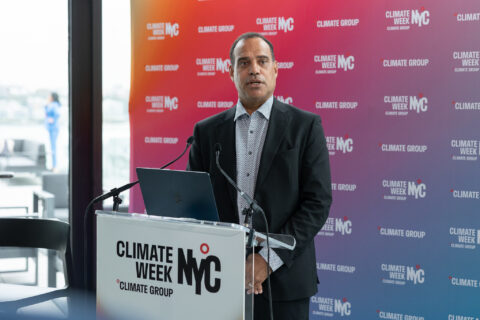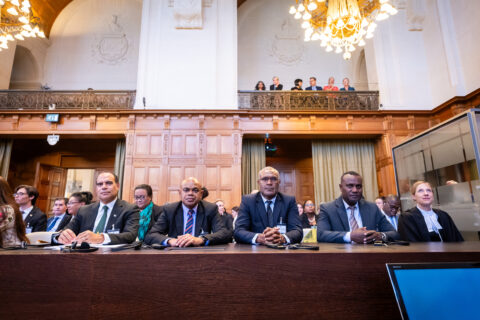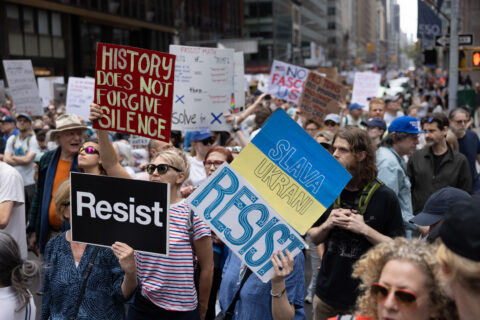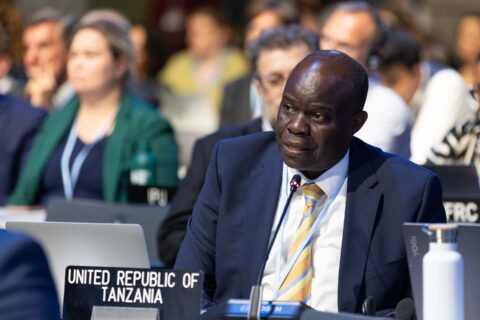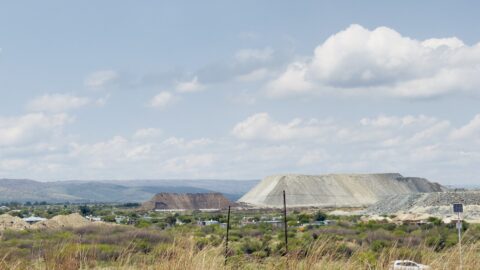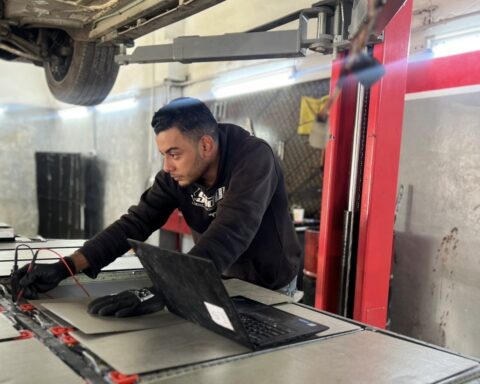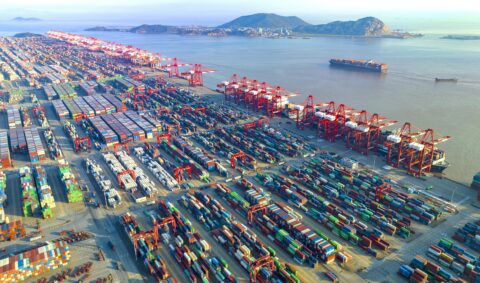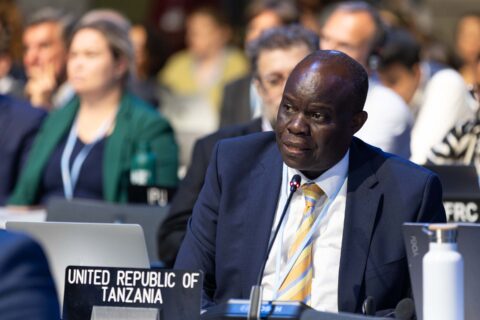Indigenous peoples have converged on Belém to participate in the COP30 UN climate summit, which opened on Monday – yet many of them will not be able to enter the part of the conference where governments make key decisions.
According to The Coalition of Indigenous Peoples of Brazil (APIB), about 2,500 Indigenous representatives – the most ever at a COP – are expected to attend. Yet only 14% of those from Brazil (360 individuals) have secured accreditation for the Blue Zone, the restricted area for official negotiations.
The previous record for Indigenous participation was set in Paris in 2015 and matched in Dubai in 2023, with about 350 Indigenous attendees each, according to COP30 organizers.
This broader turnout results from Brazilian initiatives to include as many peoples as possible in climate discussions. These include the Peoples’ Circle – an umbrella group for Afro-Brazilian, Indigenous and traditional communities – a dedicated pavilion in the Green Zone, and the COP Village, a camp welcoming participants from Tuesday this week.
Indigenous participants from Brazil attend as part of the party overflow category, which lets the country include additional representatives beyond its official UN delegation. The 360 credentials were transferred to APIB, which gathered nominations from regional organizations and submitted the final roster to Itamaraty, Brazil’s Ministry of Foreign Affairs.
Holders of this credential can enter negotiating areas but cannot contribute to discussions, vote or join closed meetings. Still, they can follow delegations closely, so they can interact with national experts, participate in side events and share their perspectives on negotiation priorities.
Blue Zone/Green Zone separatism
However, Indigenous people who took part in a demonstration that turned violent at the entrance to the Blue Zone on Tuesday said they wanted to catch the attention of the UN and the Brazilian government regarding their inability to participate in the proceedings.
They are critical of the Green Zone/Blue Zone division established by the UN, which separates most civil society from the spaces where countries’ negotiators and official delegations circulate.
The protest at COP30 took place in the evening, when a group of unaccredited demonstrators entered the restricted area and clashed with security guards. Videos recorded the moment when the group pushed doors and ran into the area.
Indigenous leader Gilson Tupinambá, from Papagayo village in the Tapajós Arapiuns Extractive Reserve area, explained that it was a way to take a stance against the UN framework. “Reflecting on this separatism, this ‘apartheid’, we don’t want this Blue Zone/Green Zone separatism,” he said.
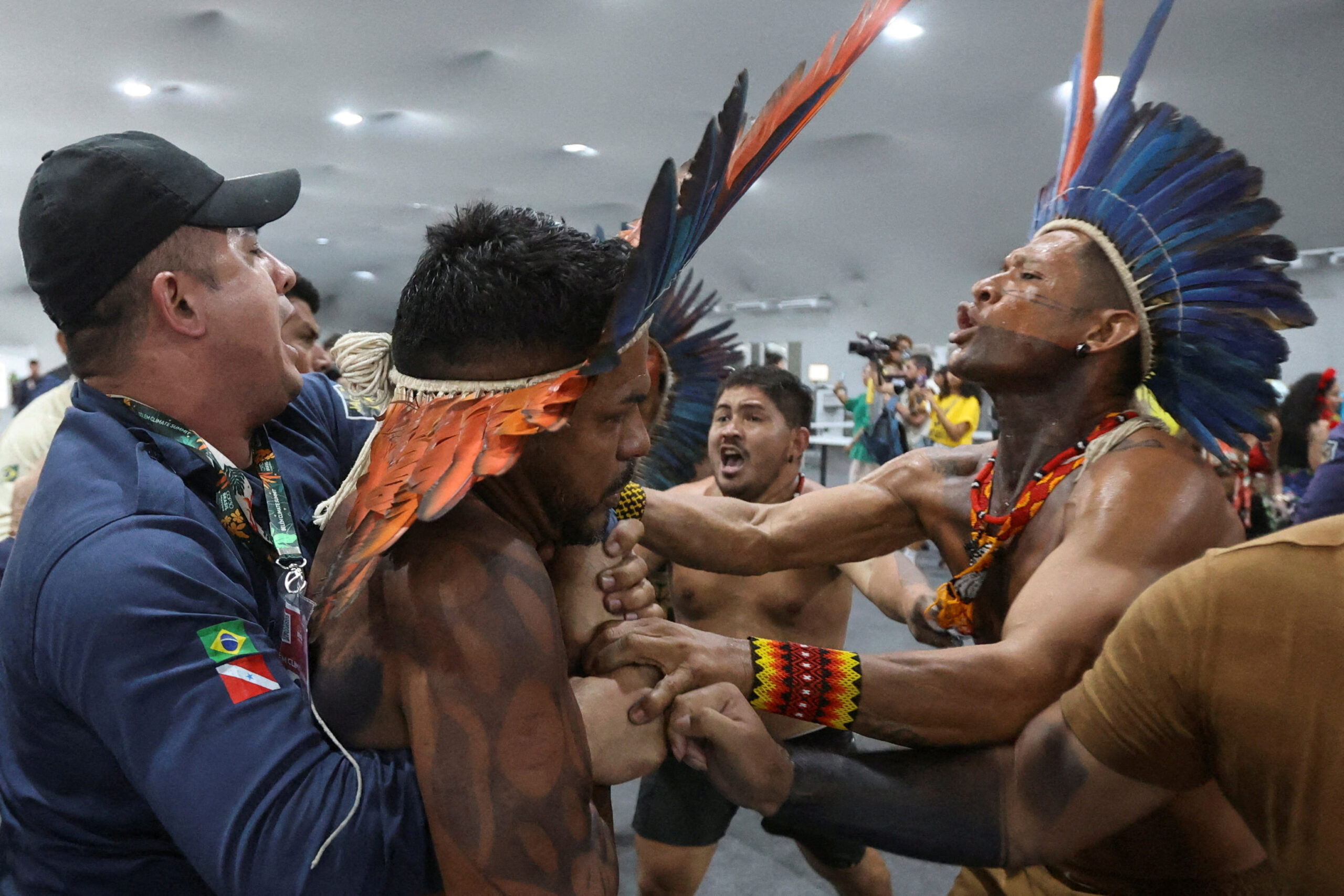

In an interview with InfoAmazonia, Brazil’s Minister of Indigenous Peoples Sonia Guajajara said she regretted what happened: “I’m deeply sorry about that because, if the idea was to guarantee participation, this COP already has the largest indigenous participation in the history of COPs.”
Toya Manchineri, coordinator of the Coordination of Indigenous Organizations of the Brazilian Amazon (Coiab), believes participation is still insufficient. Indigenous leaders want to be included in Brazil’s official delegation, he said.
“Ideally, we would participate as negotiators within the official country delegation, right? That would make a real difference. In a conversation with [Indigenous Peoples] Minister Sônia [Guajajara], I told her: ‘Minister, let’s work together so the Brazilian government considers Indigenous leaders as part of the official delegations for negotiations.’ It would make this a different COP,” he said.
Dredging for minerals in the Amazon
Lucas Tupinambá, a young Indigenous leader from the Tapajós-Arapiuns Indigenous Council and resident of Santo Amaro village along the Tapajós River, spent two days traveling by boat to reach COP30.
He attended the opening plenary session on Monday, where he denounced the presence of dredgers – vessels extracting minerals from the river – around the Tapajós and demanded climate mitigation and adaptation measures.
At first, Lucas was struck by the COP30 venue but criticized its separation from the local community. “To be here, you need accreditation, and in my region, only two people received it. The process is also expensive. They are not interested in hearing from those who truly need to be heard,” he said.
He is particularly concerned about the oil agenda and resource exploitation in the Amazon. “We have to stay alert, because many events take place throughout the day. As a social movement, we must constantly monitor where these discussions are happening. Before any talks about oil, dredging Amazonian rivers, privatization or any measure that could harm the rights of Amazonian peoples, they must listen to us,” he said.


Land demarcation as climate policy
APIB, Brazil’s leading Indigenous organization, has a clear goal for the conference: to make Indigenous land demarcation an official climate policy, enshrined in the country’s Nationally Determined Contribution (NDC).
This push, underway for two years, is led by the ‘We Are the Answer’ campaign, which has reached Indigenous communities worldwide. “Our core message is that demarcation and territorial protection are policies for facing the climate emergency. This needs not just to be acknowledged, but also implemented by global leaders – and in our case, above all, by Brazil,” says Kleber Karipuna, APIB’s executive coordinator.
APIB has championed this agenda at major events, including the Pre-COP in Brasília and Climate Week in New York. It was also presented during the COParente Cycle, an initiative under the Peoples’ Circle led by the Ministry of Indigenous Peoples (MPI) and the National Foundation for Indigenous Peoples (FUNAI), which took place in various territories.
At COP30, roadmap away from fossil fuels gains ground – but next step unclear
At the opening plenary on Monday, President Luiz Inácio Lula da Silva echoed APIB’s call, urging the international community to “recognize the role of Indigenous territories and traditional communities in mitigation efforts.”
His remarks suggest possible paths forward. For Toya Manchineri, the challenge now is persuading all participating countries to include this measure in the final COP30 agreement. “For us, it’s already a victory that the president recognizes this need. Now we’ll see if he can persuade other heads of state,” he said.
Indigenous programming
At COP conferences, Indigenous organizations participate in plenary sessions, debating issues such as territorial protection, extreme weather impacts, mining, adaptation strategies and health, among other topics.
For COP30, the presidency established the Peoples’ Circle, led by Minister Sônia Guajajara. This forum includes two main bodies: the International Indigenous Commission, with Indigenous representatives worldwide, and the International Commission of Traditional Communities, Afro-descendants and Family Farmers, bringing together delegates from 16 Latin American countries.
The Peoples’ Circle has its own pavilion at the conference, serving as a venue for climate justice debates and amplifying grassroots civil society voices who share insights from their territories.
In addition on Monday, the assembly of the COP Village, a camp at the Federal University of Pará (UFPA), supported by the Ministry of Indigenous Peoples (MPI), began. There, plenary debates on climate change and its impact on Indigenous lands are being held. The Ministry of Indigenous Peoples (MPI) expects 3,000 attendees from Brazil and abroad.
“We worked closely with the COP presidency to ensure this level of participation and visibility for Indigenous peoples. I believe this will leave a legacy that extends beyond mere participation,” said APIB leader Kleber Karipuna. Securing such a large Indigenous presence at COP30 in Brazil is unprecedented—a historic achievement, both in the Blue Zone and other venues.”
This report was produced by InfoAmazonia as part of the COP30 Socio-Environmental Collaborative Coverage initiative. Read the original report here (this is an updated version): https://infoamazonia.org/2025/11/10/mesmo-com-presenca-recorde-apenas-14-dos-indigenas-brasileiros-devem-acessar-espaco-de-decisao-na-cop30/
The post Despite record turnout, only 14% of Indigenous Brazilians get access to COP30 decision-making spaces appeared first on Climate Home News.
Despite record turnout, only 14% of Indigenous Brazilians get access to COP30 decision-making spaces
Climate Change
Why the ICJ’s advisory opinion on climate change took a backseat at COP30
With the International Court of Justice’s landmark advisory opinion on climate change hot off the press this July, hopes were high it could be used as a diplomatic lever for stronger climate action at COP30 in Brazil. But it proved a difficult tool to wield in a tense atmosphere.
The advisory opinion (AO) from the world’s top court – which determined that all states have obligations to protect the climate system from significant harm – has already been woven into new climate litigation and existing legal cases, and judges are starting to reference it in their rulings.
The Mexican community of El Bosque in Tabasco even managed to use it as leverage in recent negotiations with the central government over its latest national climate plan (NDC).
Yet, while some countries wanted the ICJ’s non-binding conclusions to feature in the main political decision approved at November’s climate COP in the Amazon city of Belém, the lack of a coordinated strategic push meant that did not happen, legal experts said.
Monaco, Mexico, the Alliance of Small Island States (AOSIS) and the group of Least Developed Countries (LDCs) all called for the ICJ’s decision – and two other climate advisory opinions from the Inter-American Court of Human Rights and the International Tribunal on the Law of the Sea – to be recognised during various COP30 presidency consultations.
But Jennifer Bansard, the Earth Negotiations Bulletin team leader, told journalists at COP30 that these requests were “at very generic levels” and did not go into the courts’ actionable findings.
“Deep, deep, deep red line”
The closest the ICJ advisory opinion came to being mentioned in a formal text was during a review of the Warsaw International Mechanism for Loss and Damage (WIM). This is key as experts believe the decision has particularly significant implications for the new loss and damage fund.
During these discussions, the Independent Alliance of Latin American and Caribbean Nations (AILAC) said the AO provides “an informed legal foundation” for advancing work on loss and damage. They pointed to “the need for comprehensive assessment and health protection” for vulnerable groups and “forms of reparation” This was supported by Vanuatu, which led the diplomatic work resulting in the ICJ opinion.
But Saudi Arabia, representing the Arab Group, responded that the ICJ’s final outcome is “non-binding” and “does not represent parties’ views” even though it participated in the process. Negotiations, it added, are a “party-driven process based on consensus, and not litigation”.
According to a source in the room, the Arab Group described the inclusion of the ICJ AO anywhere in the WIM document as a “deep, deep, deep red line”. “If you insist on discussing it, we might as well just suspend this session to not waste each other’s time,” said Saudi Arabia’s negotiator. The AO is not mentioned in the final agreed WIM text.
“We are still here” – COP30 tests resolve to keep fighting climate crisis
Harjeet Singh, founding director of the Satat Sampada Climate Foundation and strategic advisor to the Fossil Fuel Non-Proliferation Treaty Initiative, said the group was particularly concerned about the ICJ’s reference to the status of a state as developed or developing as “not static”.
“They feared that formally recognising the opinion would open the door to limitless legal liability for fossil fuel production,” he explained.
Left out of the COP30 cover decision
In addition, the AO’s recognition of a “just and fast transition in line with best available science” was mentioned by Fiji, for the Alliance of Small Island States (AOSIS), at an inaugural meeting on the Just Transition Work Programme. AILAC, Egypt and the UK also raised it during just transition negotiations, while Malawi used it to try to frame transition finance as a legal necessity.
Some states had expected the cover decision to recognise the AO in some form, but text drawn up by Brazil’s COP presidency did not include relevant wording.
The lack of references came despite the fact that the UN asked the ICJ for the advisory opinion unanimously and 96 countries spoke at the hearings.
Data visualisation developed by law professor Margaret Young and designers Dan Parker and Stanislav Roudavski.
Singh said the COP30 battle lines were drawn so sharply on the ICJ opinion because it validates the claims of vulnerable countries for climate justice, while historical and large polluters wanted “to avoid acknowledging any legal framework that implies liability”.
But, he added, while pushing back strongly against it, developed countries “neither championed nor explicitly opposed it in open plenary to avoid negative optics”.
The ICJ’s recognition that COP decisions may have legal effects could also make negotiators more wary of what they agree to.
In the closing COP30 plenary, Palau for AOSIS noted the ICJ’s clear assertion of 1.5C as the legal temperature limit. Yet the final Mutirao decision explicitly reiterates the Paris Agreement’s language of “pursuing efforts” to reach that level, while retaining the original goal of “well below 2°C”.
No coordinated push to champion the AO
Harj Narulla, a barrister specialising in climate litigation and counsel for the Solomon Islands, argued the COP30 decision “undermined” the ICJ’s conclusions. But barring a few nations like Saudi Arabia, he saw the overall outcome as a “failure of capacity and coordination, rather than a principled opposition to using the AO”.
Insiders said government negotiating teams remain too separate from their legal teams, and the former were not properly briefed on how the AO could be used in practice.
The leadership expected from climate-vulnerable countries, particularly the island nations that had advocated for the AO in the first place, also seems to have been absent. A briefing by Ed King and Lindsey Smith, who work on international climate strategy for the Global Strategic Communications Council, described AOSIS’s showing at COP30 in particular as “insipid”.
EU alliance with climate-vulnerable nations frays over finance trade-off
Ralph Regenvanu, minister of climate change of Vanuatu and a key architect of the AO campaign, mentioned it several times in public, including at Cambodia’s announcement that it would formally support a fossil fuel non-proliferation treaty. But his focus seemed to be on pursuing a new UN resolution recognising the ICJ’s findings.
Neither AOSIS nor Regenvanu responded to requests for comment.
Influencing the wider narrative
Nonetheless, Mohamed Adow, director of Power Shift Africa who has followed the climate talks for many years, believes the AO is “starting to influence the wider narrative around responsibility and liability”.
“Though it did not make the ‘waves’ in the formal text that many hoped for, it was clearly the ‘undercurrent’ beneath many streams of negotiation,” agreed Singh.
Nikki Reisch, climate and energy programme director at the Center for International Environmental Law, an organisation that supports the youth activists who sparked the AO process, said the opinion also supports “the need to reform the UNFCCC to make it fit for purpose”. That includes preventing fossil fuel industry influence and allowing majority voting so that a handful of countries cannot block climate action.
Eyes on Colombia fossil fuel transition conference
In 2026, the opinion may start to play a stronger role on the global stage, including at an international conference on a just transition away from fossil fuels co-hosted by Colombia and The Netherlands next April.
The Fossil Fuel Treaty initiative says that gathering will align with the AO, “which confirmed that states have a legal obligation to protect the climate, including by addressing fossil fuel production, licensing and subsidies”.
Colombia seeks to speed up a “just” fossil fuel phase-out with first global conference
Experts, meanwhile, expect more domestic lawsuits underpinned by the advisory opinion aimed at pushing countries to raise their ambition on cutting emissions and say inter-state litigation cannot be ruled out.
“COP30 in Belém is by no means the last word on the ICJ AO or the climate duties it confirms,” Reisch said.
A version of this article was originally published in The Wave.
The post Why the ICJ’s advisory opinion on climate change took a backseat at COP30 appeared first on Climate Home News.
Why the ICJ’s advisory opinion on climate change took a backseat at COP30
Climate Change
China risks emissions rebound amid policy shifts, experts warn
After holding stable for two years, China’s carbon emissions may climb back up as the construction of new fossil fuel power plants accelerates and recent policy changes cloud the outlook for clean energy, a new report warned.
The world’s biggest carbon polluter is expected to keep total emissions flat in 2025 despite rising energy demand – a sign that clean power may, for the first time, fully offset the growth in electricity consumption, the analysis by the Centre for Research on Energy and Clean Air (CREA) showed.
But the Finland-based research group cautioned that a “concerning” policy environment for the next few years increased the risk of an emissions rebound. It added that China was also set to miss its key target for cutting carbon intensity – CO2 emissions per unit of gross domestic product – this year, meaning steeper reductions will be needed to hit its headline 2030 climate goal of slashing carbon intensity by 65%.
Belinda Schäpe, China policy analyst at CREA, said it was unclear how strongly committed China remained to its targets, despite leaders’ assertions that the government always makes good on its climate promises.
“All of this uncertainty raises a lot of questions around where emissions are going,” Schäpe told Climate Home News. “At the moment, it’s very finely balanced. They are just about flat but could well go up or down again based on the decisions that the government will make.”
New pricing model for renewables
Record solar energy installations and strong growth in wind power capacity have increased the share of non-fossil fuel electricity this year, with emissions from the power sector set to decline for the first time since 2016, the report said. But that progress has been partially countered by the rapidly growing use of coal for the production of plastics and other chemical products, meaning overall emissions are expected to remain stable.
At the same time, experts have warned that China’s new pricing system for solar and wind projects risks slowing the clean energy boom. Under the new policy introduced last June, developers of new solar and wind power plants need to secure contracts with provincial authorities through competitive auctions, instead of being guaranteed a fixed price.
Schäpe said prices had been “very, very low” in some of the auctions so far. “Of course, that’s great for consumers, but it’s really bad for project developers because they don’t want to go ahead and invest in new projects facing the risk of no returns,” she said.
Earlier this year, the International Energy Agency (IEA) cut its forecast for China’s 2025-2030 renewables growth by 5% due to the changes in the pricing model. The watchdog’s head Fatih Birol said the profitability of renewables projects – especially solar and wind – was expected to decline between 10% and 15% with the new policy.
Coal power boom continues
Coal power plants, on the other hand, are protected from this market-based system, relying instead on long-term power purchase agreements that lock in prices, Schäpe said, describing it as “unfair competition”.
China’s rapidly expanding coal power fleet is adding to the concerns. In 2025, the country has added the largest amount of coal-fired capacity since 2015, while progress on retiring older plants remains very slow, CREA’s report highlighted.
This runs contrary to a pledge made by President Xi Jinping in 2021 to “strictly control” new coal power projects. That commitment was omitted from Beijing’s updated national climate plan (NDC) submitted in late October ahead of COP30.
In its new NDC, China set an absolute emission reduction target for the first time, committing to cutting its greenhouse gas emissions by between 7% and 10% by 2035 from unspecified “peak levels”.
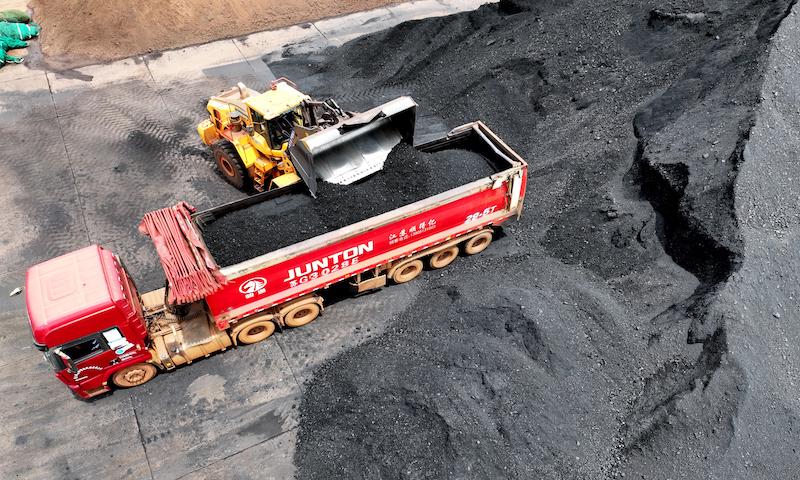

Focus on next five-year plan
Schäpe said that the absence of a base year could create an incentive to raise emissions and “storm the peak” – pushing them as high as possible to make future reduction targets easier to meet.
She said this put the focus on China’s 2030 carbon intensity target, adding that if Beijing was still serious about meeting it, emissions would need to peak “around now”.
China targeted an 18% reduction between 2021 and 2025, but it is projected to achieve about 12% by the end of this year, CREA’s report said. If that is confirmed, China will then need to significantly ramp up efforts to cut carbon intensity in the next five years to achieve its headline climate commitment for 2030.
Analysts expect China’s new five-year plan – the blueprint for its economic development – to provide more clarity on the country’s energy policies next year.
“We will see how the government is going to balance these two opposing forces: the outgoing coal industry interests and the new cleantech sectors that are meant to become the driver of future growth,” Schäpe said.
The post China risks emissions rebound amid policy shifts, experts warn appeared first on Climate Home News.
China risks emissions rebound amid policy shifts, experts warn
Climate Change
Proposal for global minerals deal meets opposition as China looks away
Saudi Arabia, Russia and Iran are among countries opposed to discussing options for agreeing on global norms to protect people and the planet from the impacts of mining, processing and recycling minerals needed for the clean energy transition, documents seen by Climate Home News show.
Environment officials gathered in Nairobi, Kenya, ahead of the UN Environment Assembly (UNEA) next week are discussing a resolution by Colombia and Oman that aims to make mineral supply chains more transparent and sustainable at a time when growing demand is spurring resource-rich countries to court investment and boost production.
They have proposed the creation of an expert group to identify a range of binding and non-binding international instruments “for coordinated global action on the environmentally sound management of minerals and metals” from mining to recycling. The group would also look at how to handle mining waste and provide guidelines on recovering minerals from tailings responsibly.
Those instruments could range from a global minerals treaty to a non-binding declaration or set of standards on best practice. The resolution is co-sponsored by Armenia, Ecuador and Zambia.
Colombia has previously called for an international minerals treaty to define rules and standards that would make mineral value chains more transparent and accountable.
China, US on the sidelines for now
But Iran, Russia and Saudi Arabia, which is emerging as a major player in mineral supply chains, oppose launching a process that could lead to an international agreement on the issue, according to several sources and documents shared with Climate Home News.
Countries will vote on the proposal next week, during the seventh session of UNEA, the world’s top decision-making body for environmental matters.
China, which dominates the processing of 19 of 20 minerals deemed critical for the global economy, has so far stayed quiet about the proposal, but analysts said Beijing was unlikely to support any supranational initiative to govern mineral supply chains.
China’s priority is “to remain sovereign throughout the process of how these minerals are produced and traded” and to promote cooperation “on its own terms”, said Christian-Géraud Neema, an expert on Chinese engagement in Africa’s transition minerals sector and the Africa editor of the China-Global South Project.
The US, which has been trying to counter China’s critical minerals clout, is not attending UNEA, while the EU – another major global market – is understood to broadly support the proposal.
A spokesperson for the US State Department said: “Our team in Nairobi is focused on the US-Kenya relationship and delivering results for the American people, rather than litigating endless woke climate change theater.” The European Commission did not immediately respond to a request for comment.
Several other countries have raised objections. Chile, a top producer of copper and lithium, wants to narrow the focus of the resolution to voluntary cooperation on illegal mining.
In Africa, most countries back the Colombia-Oman proposal, but Uganda and Egypt oppose it, said Nsama Chikwanka, director of Publish What You Pay Zambia, an NGO focused on resource sovereignty.
“Race to the bottom”
Campaigners say countries should unite at UNEA to pave the way for talks on the issue, with some saying binding rules should be the eventual target.
“The investments that are coming to countries like Zambia are from multinational enterprises and national laws are inadequate to ensure that robust standards are applied. So we need something that is internationally binding,” Chikwanka said.
This comes after opposition from China and Russia thwarted a push by mineral-rich developing countries as well as the UK, the European Union and Australia to reflect the environmental and social risks associated with mining-related activities in the outcome of COP30.
“What we are seeing at the moment is a huge race to the bottom of environmental standards at the same time as the impacts of mining are already immense,” said Johanna Sydow, a resource policy expert who heads the international environmental policy division of Germany’s Heinrich-Böll Foundation.
“It is the chance now to create a long-lasting space for governments to work together on this issue,” she told Climate Home News.

The race to extract minerals like lithium, nickel, copper, cobalt and rare earths needed to manufacture batteries, solar panels, wind turbines and other advanced digital and military technologies has led to growing cases of human rights violations, social conflict and environmental harms around the world.
In Indonesia, nickel mining is fuelling deforestation, in Zambia, copper mining has led to catastrophic leaks of mining waste and in Latin America, Indigenous Peoples say the rush to extract lithium for batteries is trampling their rights.
In 2024 alone, the Business and Human Rights Resource Centre recorded 156 allegations of human rights abuses linked to the mining of energy transition minerals.
Counter-proposals favour non-binding measures
Opposed to global discussions about possible binding tools to govern mineral supply chains, Saudi Arabia and Iran have instead suggested the creation of a technical platform that could review the impacts of mineral extraction in developing countries, explore options for support to address them, and advance voluntary cooperation on environmentally-sound practices.
Digging beyond oil: Saudi Arabia bids to become a hub for energy transition minerals
Saudi Arabia is already cooperating with mineral-rich nations on its own terms by investing billions of dollars in transition minerals abroad in a bid to become a global mineral processing hub that could become a counterweight to China’s dominance.
China, meanwhile, threw its weight behind a G20 agreement on a voluntary and non-binding Critical Minerals Framework intended to ensure that mineral resources “become a driver of prosperity and sustainable development”.
At the G20 leaders’ summit in South Africa last month, which was snubbed by the US, China also launched an economic and trade initiative on minerals, aiming to secure access to minerals in exchange for cooperation on technology, capacity-building and financing.
At least 19 countries, including Cambodia, Nigeria, Myanmar and Zimbabwe, alongside the UN Industrial Development Organisation, have reportedly joined the initiative.
For Neema, of the China-Global South Project, this is an explicit attempt to counter resource diplomacy by the US, which is offering developing countries security and military support in exchange for minerals.
“Producing countries in the Global South are more likely to be attracted by this approach because they know that the likelihood of Chinese companies and banks showing up is quite high,” he said.
The post Proposal for global minerals deal meets opposition as China looks away appeared first on Climate Home News.
Proposal for global minerals deal meets opposition as China looks away
-
Climate Change4 months ago
Guest post: Why China is still building new coal – and when it might stop
-
Greenhouse Gases4 months ago
Guest post: Why China is still building new coal – and when it might stop
-
Climate Change2 years ago
Spanish-language misinformation on renewable energy spreads online, report shows
-

 Greenhouse Gases2 years ago
Greenhouse Gases2 years ago嘉宾来稿:满足中国增长的用电需求 光伏加储能“比新建煤电更实惠”
-
Climate Change Videos2 years ago
The toxic gas flares fuelling Nigeria’s climate change – BBC News
-

 Climate Change2 years ago
Climate Change2 years ago嘉宾来稿:满足中国增长的用电需求 光伏加储能“比新建煤电更实惠”
-

 Carbon Footprint2 years ago
Carbon Footprint2 years agoUS SEC’s Climate Disclosure Rules Spur Renewed Interest in Carbon Credits
-
Climate Change2 years ago
Why airlines are perfect targets for anti-greenwashing legal action




